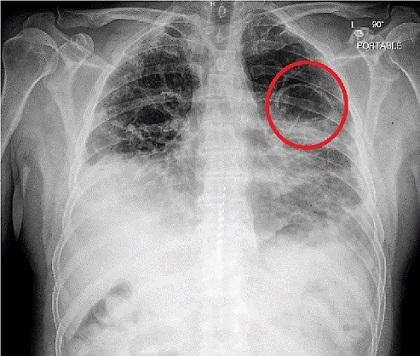Physician Warns Of Pneumatocele Manifestation In Early Recovery Period of COVID-19
Thailand Medical News Team Aug 07, 2023 2 years, 6 months, 1 week, 6 hours, 51 minutes ago
COVID-19 News: The COVID-19 pandemic has been one of the most significant challenges in modern history, causing a paradigm shift in medicine. The virus, Severe Acute Respiratory Syndrome Coronavirus 2 (SARS-CoV2), has led to millions of cases and deaths worldwide, with ever-evolving implications and long-term consequences. As covered in various past studies and
COVID-19 News reports.
 Chest X-ray of pneumatocele in left upper lobe of lung (red circle)
Chest X-ray of pneumatocele in left upper lobe of lung (red circle)
Among the myriad of pathologies associated with COVID-19, pneumatoceles, thin-walled, air-filled lesions in the lung parenchyma, have emerged as an intriguing and somewhat enigmatic manifestation during the early recovery phase of the viral illness. Pneumatoceles are typically observed in the lung after infections, trauma, or as part of more extensive cystic diseases.
The Case Study
In this case report, we delve into the fascinating journey of a 54-year-old Caucasian male patient diagnosed with COVID-19 infection 29 days prior to his hospital presentation. He complained of dyspnea and sharp pleuritic chest pain localized in the left mid-axillary region, worsened by deep inspiration and exacerbated by a significant forceful cough episode a day before admission.
The patient's preliminary labs showed no leukocytosis or neutrophilia, with normal troponin levels and a negative COVID-19 test upon presentation.
Radiographic imaging revealed bilateral infiltrates in the left upper lobe and air-fluid levels, initially raising concerns for an abscess but later suggestive of a pneumatocele. Importantly, imaging ruled out pneumothorax. The patient was closely monitored, remained stable throughout his hospital stay, and was discharged after fungal and bacterial infections were ruled out, with the expectation of self-resolution of the pneumatocele.
Unraveling the Mechanism
The exact mechanism behind pneumatocele formation during the early recovery phase of COVID-19 remains unclear. COVID-19 is known to cause inflammation of the lungs, leading to atelectasis, pleurisy, and cough, among other respiratory complications. The virus targets the alveolar epithelial cells, compromising the structural integrity of the lung parenchyma and increasing susceptibility to alveolar rupture. This, combined with the forceful coughing episodes experienced by COVID-19 patients, may contribute to the formation of pneumatoceles. These air-filled lesions are typically asymptomatic and tend to resolve on their own without requiring specific treatment.
Understanding Pneumatoceles and their Management
Pneumatoceles are rare in adults and are more commonly observed in infants, children, and adolescents. While the incidence and pathological mechanism in the context of COVID-19 are still uncertain, it is believed that diffuse alveolar damage caused by the virus could lead to necrosis within airway walls and subsequent pneumatocele formation. CT scans of the chest are instrumental in identifying and distinguishing pneumatoceles from other pathologies, such as abscesses. Chest X-rays may show
thin-walled cysts appearing several days after an infectious event.
Fortunately, uncomplicated pneumatoceles typically have a favorable prognosis and may resolve on their own. However, there are potential risks of complications such as pneumothorax or tension pneumatoceles, which can have severe implications for a patient's health. In such cases, percutaneous drainage may be required.
A number of other studies and case reports have also showed the manifestations of pneumatocele in COVID-19 individuals and even in those with Long COVID.
https://www.tandfonline.com/doi/full/10.1080/20018525.2022.2028423
https://www.cureus.com/articles/107529-covid-19-associated-pneumatocele-and-subsequent-pneumothorax#!/
https://casereports.bmj.com/content/14/4/e242729
https://erj.ersjournals.com/content/60/suppl_66/1484
https://www.sciencedirect.com/science/article/pii/S2213007120305177
https://journal.chestnet.org/article/S0012-3692(21)02958-5/fulltext
https://link.springer.com/article/10.1007/s11748-022-01771-0
https://onlinelibrary.wiley.com/doi/10.1002/ccr3.5698
https://www.jtcvstechniques.org/article/S2666-2507(20)30511-3/pdf
Conclusion
The emergence of pneumatoceles in the early recovery phase of COVID-19 adds another layer of complexity to the already intricate spectrum of respiratory manifestations of the viral illness. As medical professionals continue to manage patients with COVID-19, understanding the pathophysiology of pneumatoceles becomes crucial to ensure appropriate monitoring and treatment. Research and case studies like the one presented here contribute significantly to our knowledge and aid in providing the best possible care to those affected by this unprecedented global health crisis.
The case study was published in the peer reviewed journal: Cureus.
https://www.cureus.com/articles/157905-pneumatocele-manifestation-in-early-recovery-period-of-covid-19-a-case-study#!/
For the latest
COVID-19 News, keep on logging to Thailand Medical News.
